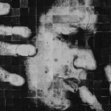Aaron Polson's Blog, page 27
May 19, 2011
#%*$& You, Semi-Colon! (Writer, Edit Thyself)
Ah, the oft-misunderstood semi-colon.
It really only has three functions in modern punctuation.
1. Joining two independent clauses.* This implies the two clauses are related and/or equal, or perhaps one restates the other.
The boys and I are on our own this weekend; we'll eat too many hotdogs and watch cartoons.
2. Use semi-colons between items in a list that already involve commas.
I have lived in Clay Center, Kansas; Manhattan, Kansas; and Lawrence, Kansas.
3. Making that funny smiley thing I use too often.
;)
That's it.
Make peace with the semi-colon. Please. I hear the rapture is coming this weekend, and I wouldn't want semi-colon hate on my head.
Write Hard!
*independent clause is a fancy way of saying "sentence". An independent clause is a string of words which can stand on its own.
May 18, 2011
WIP Wednesday: Hopes and Dreams
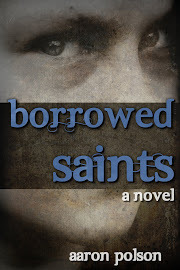 I'm on "tour" promoting Borrowed Saints (and writing in general) this week. Yesterday, I popped in to visit Cate Gardner and wrote about what was "Behind the Door". Today, I'm visiting Belinda Frisch's blog with a post about creating conflict and suspense. Stop in and say "hi". Tomorrow, I'll be leaning on Robert Swartwood with a little post about patience. God knows I need some.
I'm on "tour" promoting Borrowed Saints (and writing in general) this week. Yesterday, I popped in to visit Cate Gardner and wrote about what was "Behind the Door". Today, I'm visiting Belinda Frisch's blog with a post about creating conflict and suspense. Stop in and say "hi". Tomorrow, I'll be leaning on Robert Swartwood with a little post about patience. God knows I need some.More stops to follow.
So about this WIP Wednesday...
I'm writing a vampire-esque novella. I'm brainstorming for a middle grade (holy-sh*t, MG?) sci-fi, slipstreamy adventure book. My dear wife inspired me to write it, saying: "Why don't you write something Owen can read?" Yeah, why don't I?
And then there's the sequel to Borrowed Saints. Yes, I've already started writing that...
Sheesh. I'm starting to sound like Barry Napier with all this WIPing (love you, Barry).
Speaking of my dear wife... I want to share a dream of mine. I'd love for her to be able to stop working. She has terrible nerve issues in her mouse hand and a job which requires a ridiculous amount of clicking. She has back trouble stemming from a car accident when she was twenty.
I've taken on e-book formatting and cover design on the side (www.simplekindleformatting.com) to try and supplement our income. I'm continuing to write and hopefully build an audience. I'd love to add enough to the communal pot that she could stop working, or at least cut back and only see clients part time.
That's the dream.
Now that I've written it down, I need to get to work.
May 17, 2011
Anatomy of a Murder (and Resurrection)
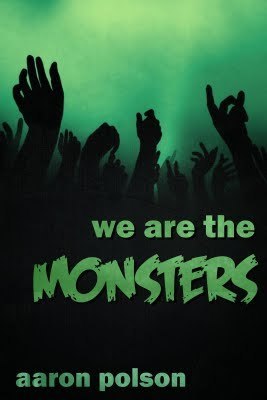 I killed We are the Monsters last week. It was a hard choice to make because it had already received one nice 5-star rating at Amazon.
I killed We are the Monsters last week. It was a hard choice to make because it had already received one nice 5-star rating at Amazon. I planned on changing the cover (and I do like the new cover much better than the old), but I wouldn't have needed to kill the book without the digital rights management (DRM) debacle.
See, I accidentally selected "enable DRM" when I first published the book. (Don't know what DRM is? Read this.) I don't believe DRM is good for authors. The debate rages on, of course, but in my opinion, it hurts.
If I want people to read my stories (which I've decided is goal #1), why would I put roadblocks in their way? Some writers get all kerfluffled about pirates giving away their books. I say go for it--as long as you don't start selling those pirated books under a different name. Just give me credit, and we're good. Go ahead. Steal my books. Give them away. Grow my audience.
The only way to free We are the Monsters from the DRM monster was to kill it and publish it again from scratch. So I did. It has a brand new, completely linked table of contents, new cover art, and freedom from DRM. None of my other books have DRM, either. It just doesn't make much sense.
And you can download it at Smashwords for free (for the time being). The Amazon Kindle edition is only 99 cents.
How do you feel about DRM? Piracy?
(And if you've read We are the Monsters, I'd love to hear what you think--good or bad. Amazon reviews are a writer's friend.)
May 16, 2011
You Are Not Your Stories
In html, it would look like this:
rant /rant
In real life it looks like this:
Hey, writer! Yeah, you. You are not your stories. Yes, you've spent time crafting them, cuddling with them, brushing their hair, feeding them, and sending them into the world. But they are not you. They aren't even, really, a part of you, no more than the the u-bend of my toilet is part of my plumber.
I know it's a popular thing to say: each story I write is part of me.
But this is why authors tend to take too much personally. A rejection is not about you. A bad review is not a reflection on you as a person. How you respond (or don't respond) might be, but the review itself isn't.
I've written scores of stories and several short novels. This is the 728th post to my blog. I've even composed some poetry. If every word I wrote was a piece of me, I'd have gone Lord Voldemort years ago and littered the digital landscape with tiny fragments of my soul. Now that would be scary.
Yes, I care about my art--but experience has taught me this: me ≠ my writing. Thank Zeus.
If I was to rant, it might look something like this:
rant Stop pissing on other writers, reviewers, editors, and write. /rant
Have a great day, people.
May 15, 2011
#samplesunday Monsters Among Us
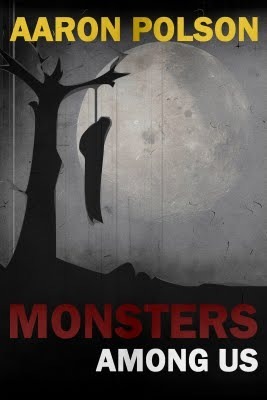
"Billy Boy"
(originally published at Every Day Fiction and selected for The Best of Every Day Fiction Three)
Billy found the keys in his dad's truck one day, shortly after they shuttered the kitchen store and the place that once sold bargain books. His dad had changed light fixtures, mended walls, and tightened pipes for five years, but without the tenants, the building no longer needed maintenance. Searching for work at the bottom of a whiskey bottle, he didn't miss the keys. Not until later.
So the mall was abandoned, a playground in which our imaginations touched other places.
We rode our bikes after school and stashed them out back, in the high grass just off the trail near the railroad tracks behind the building. Billy was always eager to go on nights his mom worked late. We first entered the dark spaces while the world shed her summer greens for the browns and tans of fall, the dingy grey of winter lurking behind the turn of the calendar.
The game was Billy's idea.
We built a circular wall of boxes in the storeroom of one of the anchors to the mall, the largest building on the south end. In our circle, our sanctuary, we told stories, we pushed our imaginations to the blackened corners to flirt with spiders and dust. Our stories grew arms and legs, fingers and eyes; they flickered just past our musty cardboard fortress. Our flashlights inspired stacks of empty boxes to cast shadows of strange cities on the walls. Games of chicken hung on who could bear the darkness the longest, who could leave his flashlight off in the dead, empty space.
We made monsters, and Billy was the best.
Maybe his father was the inspiration: the rasping, liquor tainted voice, scuffed knuckles, and glassy glare. Maybe Billy saw something different through the bruises around his eyes. Maybe he found something in the worry lining his mother's face. Billy's beasts crawled out of the darkness and ran their stunted claws over the cardboard boxes on the outer ring of that wall, sending a twist of delightful terror into my bones. Gabe's expression echoed mine, both of us pale and contorted, hanging on Billy's voice.
A tiny voice, really.
Lost and afraid.
We heard the sirens, Gabe and I, one night just after supper. We met in the street, both of us all wide eyes and whispering mouths. My guts could have been ice, frozen and scooped by the shovel load from my aching chest. The sirens came from three blocks down, police and ambulance, together.
"You think it's Billy's place?" Gabe asked, breathless.
"Let's go."
We planned to meet again that night, all three of us, and perfect our tales. We planned to go together into the darkness of the old mall, flashlights in hand, creeping through the silence, lonesomeness of the place. Billy promised mystery that night.
At his house, lights from the police cruisers and ambulance chopped the night into tiny bits. Billy's dad leaned face down on a police cruiser, hands cuffed behind him. The paramedics wheeled another body down the concrete steps, thump, thump, thump. I searched the crowd for our friend.
Gabe looked at me.
I nodded.
The October air numbed my cheeks and my hands, frosting my heart while it hammered against my ribs. I felt every bump, every jostle of the pocked asphalt in the streets, the grass that snapped against my legs as we arrived behind the building. We rode through the dark at other times, but never with so much fire, so much recklessness.
Panting, Gabe and I found one service entrance open, the key still in the lock. Neither of us brought a light.
We staggered into the darkness, the abyss, Billy's world, groping against the painted cinderblock walls. We stumbled toward the end of the line, the big storeroom, our ring fortress of empty cardboard and stories. A single, stationary light reflected on the ceiling, casting square shadows in looming distortion.
"Billy?" Gabe's voice was a tiny thing, prey swallowed by the predator darkness.
No answer.
I followed the glow and found Billy's flashlight on the floor next to a crumpled pile of his clothes. Our friend was gone, naked and alone into the other places. We knew. On his words, the shadows had swallowed him. He joined them.
Billy's face was printed in the paper, and they spoke of him on the evening news for weeks.
The smaller minds called him a runaway, just another missing boy. All too common.
Gabe and I knew the truth. We had heard the tap of claws on cardboard and tasted the frosty air from Billy's words. We lived his world in that dark, lonesome place.
May 14, 2011
Saturday Podcast: "Gary Sump's Hidden City"
Give a listen to "Gary Sump's Hidden City" from my short story collection, The Saints are Dead. Now available in dead tree format (paperback) or e-book (Kindle) from Aqueous Press.
May 13, 2011
Five Question Friday: Joel Arnold
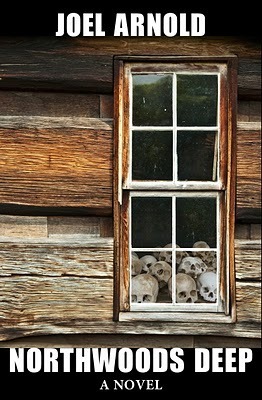 What is the hardest part of being a writer?
What is the hardest part of being a writer?For me, the hardest part is juggling writing with my family and my day job. Also, the actual writing part of being a writer can be pretty hard (but if you love it, you love it.)
Which is scarier, zombies or vampires? Why?
Depends on a lot of things. Are the zombies the slow, shuffling kind, or the fast kind? And are the vampires like Nosferatu or glittery emo kids? Overall, I think zombies are scarier, because they don't seem to have a conscience. They just have one thing on their mind--eating you! And they'll keep coming for you until you take its head off. But a vampire typically does have a conscience and there's the possibility of reasoning with it. And think about this; if you were bit by either one, would you rather be the contemplative vampire, or a mindless brain-eating machine?
What was your first curse-word?
Not exactly sure, but probably 'shit' 'damn' and 'fuck' all came out of my mouth within seconds of each other. It happened when I was three or four years old, swinging on a swing-set with a friend. For some reason, we just started shouting out curse words as we swung and thought it was so funny. It felt so freeing and great. 'Shit! Fuck! Damn!' we'd shout, and then laugh our asses off. At least until his mom heard us. Then I get the distinct feeling it was no longer so funny...
What's your favorite thing to eat or drink while writing?
I don't eat while I write, but if money was not an object, I'd drink Starbucks' caramel machiatos whenever I write. As it is, I'll treat myself to one of these every once in a while, but usually stick to regular old coffee.
If you could live in anywhere in the world, where would it be?
Hmmm...probably San Miguel de Allende, which is in the central highlands of Mexico, or Gardiner, Montana, which is at the north entrance to Yellowstone National Park.
Joel Arnold's Amazon.com Author Page and Smashwords Page
May 12, 2011
How to Love the Comma, or Writer, Edit Thyself
What I do want to convey is the ease with which a writer can learn to love (and use) commas well.
So let's start here (can you read this):
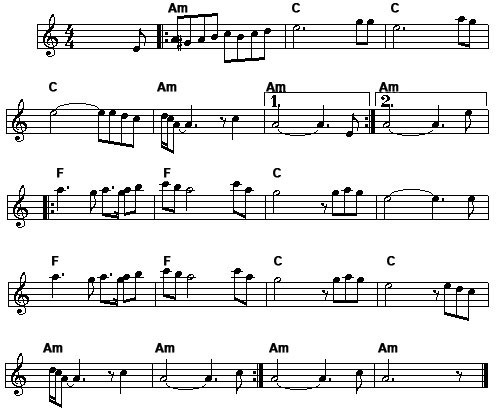
Would you read it in your head? Of course not. Music is intended for the ear. So are words. Reading silently ("in our heads") is a recent invention. Once upon a time, few could read. Books were expensive, difficult to reproduce, and precious things. (Ah, but now we have e-books and POD.) Punctuation symbols, like the comma, were invented to convey a message to the reader. Think of the comma as a rest, just like the rest in music. Where that rest is placed changes the meaning of a phrase, just like a well-placed pause in music can change the dynamic or rhythm of a song.
Take this well-circulated phrase to understand the importance of punctuation (and commas):
Woman without her man is nothing
Notice I didn't punctuate the sentence. How would you do it?
Woman: without her, man is nothing.
or
Woman, without her man, is nothing.
Wow. Big difference, right? We all know the famous "eats shoots and leaves" example.
So how does a writer learn to love commas? I suggest you must, must read your work aloud. I've done so with every story, book, and essay I've written in the last ten years. Commas were invented in an era of reading aloud. Meaning is conveyed through the way they make a sentence sound. You'll notice improper comma use much better through your ear.
For a more "academic" look at the comma, please visit Purdue University's Online Writing Lab (OWL).
Write hard.
May 11, 2011
WIP Wednesday: You're a Writer, So WRITE
Well, I haven't subbed any new stories in the past three weeks. I have four awaiting edits (hmmm, WIP). One is very short with a very long title: "Items Found Above the Bathroom Ceiling in Room 215, Best Western North, Wichita Kansas". Another is longish and needs some serious work, but I love the premise ("The Night of the Blood Moths"). So yeah, editing. "The Sons of Chaos and the Desert Dead" is in the queue for one more pass before sending it off, too. Editing.
Then I'm writing a novella for the hell of it. Because I want to. There will be blood.
One of the items from "Items Found Above the Bathroom Ceiling in Room 215, Best Western North, Wichita Kansas":
One worn copy of Stephen King's Night Shift, paperback, 1979, with several pages missing (123-167).
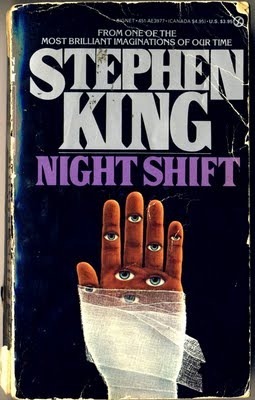
May 10, 2011
The Going Price for Lawn Service (and E-books)
Back in the summer of 1988, my brother and I started a lawn service. He'd taken care of several lawns when he was in high school in the late '70s/early '80s, and figured I needed a job. I was fresh out of seventh grade and wanted a Nintendo (original 8-bit variety).
Our base price? $5 a lawn. The going rate at the time started at $10. Of course we charged more for bigger lawns, but never more than $15. We worked together. He mowed around trees and did the trimming; I tackled the big, wide-open spaces. It was hard work. By mid July, I had my Nintendo.
Why charge less than competitors?
Volume, I guess. At the apex of our business, we managed something like 35 lawns a week.
Here's the e-book connection: volume = more readers. More readers means more potential fans. More potential fans means more potential "built-in" sales for your next book.
I've just released Borrowed Saints at $2.99. It's a YA novel, right around 50,000 words, and I spent plenty of time polishing it. Sales have been weak. Very weak. Sure, I need to so some more promotion, etc. Whatever one wants to argue about value and how much a consumer should pay--I believe e-book readers have come to expect $0.99 books from Indies. I didn't start it, and I sure didn't make it happen by myself.
Let's look at the math:
One e-book at $2.99 nets the author around $2 at 70% royalty rate. An author would need to sell six times as many books at $0.99 cents (35% royalty) to make (roughly) the same amount of money.
The math seems to argue for the higher rate, right?
But I think something else is going on, something more important. Even if you only make four sales at $0.99 to each one at $2.99, you've quadrupled your readers (or potential fans). Yes, less money now, but more potential money in the future. Like an investment, right?
When VT managed The House Eaters I sold one e-book at $4.99 in two months. Since they folded, I've sold more than 30 in a month. And yes, I'm only selling it for $0.99.
Volume can work wonders, even at very low prices.
Victorine E. Lieske has sold more than 100,000 copies of Not What She Seems at $0.99. That's a success story I'd take all the way to the bank. Granted, I don't write in the same genre and Victorine has spent a good amount of time marketing her book. But wow.
So what will I do with Borrowed Saints? What do you think I should do?
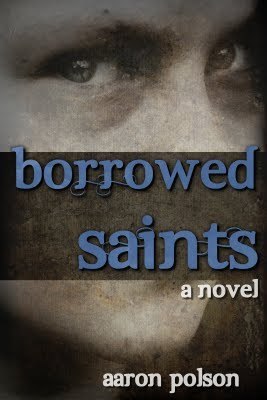
(Well, I did redo the cover. It will take a while to show on Amazon.)

